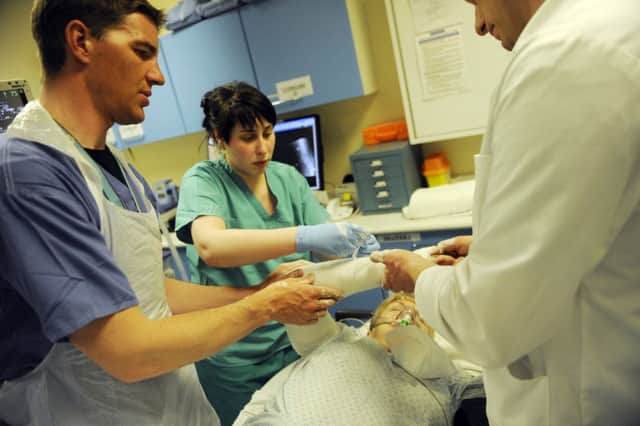Seeing your family GP ‘will soon become a luxury’


Scottish ministers were warned last night about “hazardous” cuts that are placing practices under growing strain and restricting patient access to GPs with sick people turned away from surgeries.
Liberal Democrat health spokesman Jim Hume accused the SNP government of presiding over a drastic reduction in funding during its eight years in power.
Advertisement
Hide AdAdvertisement
Hide AdThe MSP said surgeries were being forced to cope with staff shortages and that GP vacancies were left unfilled, leading to a sharp rise in patient waiting times to register with a practice.
Ministers have failed to tackle a recruitment crisis, Mr Hume said, as he claimed that just 35 new GPs had been added to the NHS workforce between 2009 and 2013.
Mr Hume said GPs were being forced to deliver 90 per cent of patient care in the NHS on less than an 8 per cent share of the overall Scottish health service budget.
He suggested that the government had failed to “realise the seriousness of the situation” with GP shortages, which he warned would affect the right of Scots to access“quick and quality treatment”.
The Lib Dem MSP talked about a “near-constant reduction” in GP funding during the SNP’s time in government from 9.2 per cent in 2007 to 7.8 per cent in 2013.
Mr Hume said: “The issue of GP recruitment and the future of GP surgeries that are faced with a crisis is one that affects the heath of nearly everyone, as general practices deliver 90 per cent of patient care in the NHS, yet receive less than 8 per cent of NHS funding.
“Naturally, this has hard-hitting consequences on GPs and the increasing demands they are facing, with increasingly shrinking budgets.
“Their funding has been facing a near-constant reduction since 2007, from 9.2 per cent to 7.8 per cent in 2013.”
Advertisement
Hide AdAdvertisement
Hide AdScotland’s GP surgeries are heading for a much deeper crisis by 2020 when that part of the NHS would become unrecognisable, with the end of an “accessible, first-point of contact service” for patients, ministers were told.
Mr Hume went on to state that shrinking GP numbers and vacancies at 463 practices across Scotland were making it increasingly difficult for patients to get appointments, with surgeries constantly forced to rely on locum services.
He said: “If the government doesn’t reverse its spending cuts from where spending cuts are the most hazardous, we will be facing a 2020 crisis, and not a 2020 vision.
“We need not look far into the future to see that this is a real problem, already facing us. 463 practices have at least one GP vacancy, while some have not been able to secure locum GPs for 15 days or more within a one-month period.
“Practices aren’t able to see as many patients as need to be seen, appointments are being slashed, waiting lists for registration are getting longer, and people are being sent elsewhere because of maximum capacity.”
Mr Hume added: “The SNP Government has taken the GP services and risks turning them from an accessible, first point of contact service for every Scot into almost a luxury service which many currently do not have access to.
“Why is the Scottish Government not ensuring that the right amount of resources is being put where GPs think it’s important? Why are we seeing less GP trainees, with less retention across Scotland? Why are current GPs under so much stress and work pressures that many see their own health deteriorate?”
Labour’s public health spokesman Dr Richard Simpson said “this growing crisis has not just emerged out of nowhere” as he claimed the SNP government had repeatedly failed to address GP shortages and boost recruitment during its eight years in power.
Advertisement
Hide AdAdvertisement
Hide AdHowever, public health minister Maureen Watt said the government would increase the number of medical students that go into GP practices and improve patients access to care.
She said: “We need to redesign primary care so services are available when people need them.”